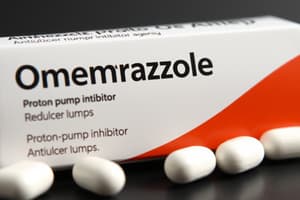Podcast
Questions and Answers
What class of medication does Omeprazole belong to?
What class of medication does Omeprazole belong to?
- Antihistamine
- Beta-blocker
- Antibiotic
- Proton pump inhibitor (PPI) (correct)
What is the mechanism of action for Omeprazole?
What is the mechanism of action for Omeprazole?
Prodrug; active form irreversibly inhibits the proton pump (H+, K+-ATPase) which significantly reduces gastric acid production.
List some therapeutic uses of Omeprazole.
List some therapeutic uses of Omeprazole.
Short-term treatment of active duodenal ulcers, gastric ulcers, erosive esophagitis, GERD, long-term treatment of hypersecretory conditions, approved OTC for short-term treatment of frequent, uncomplicated heartburn.
What are some common adverse effects of Omeprazole?
What are some common adverse effects of Omeprazole?
Rebound acid hypersecretion is not possible when stopping PPI therapy.
Rebound acid hypersecretion is not possible when stopping PPI therapy.
What is a precaution regarding Omeprazole and bone health?
What is a precaution regarding Omeprazole and bone health?
What should be monitored in patients taking Omeprazole long-term?
What should be monitored in patients taking Omeprazole long-term?
Which of the following can Omeprazole interact with?
Which of the following can Omeprazole interact with?
Omeprazole is eliminated by __________ metabolism.
Omeprazole is eliminated by __________ metabolism.
Flashcards are hidden until you start studying
Study Notes
Omeprazole (Prilosec) Overview
- Omeprazole is categorized as a proton pump inhibitor (PPI), a class of medications used to reduce gastric acid production.
Mechanism of Action
- Acts as a prodrug; once metabolized, it irreversibly inhibits the proton pump (H+, K+-ATPase), leading to marked reduction of gastric acid secretion.
Therapeutic Uses
- Indicated for short-term management of active duodenal ulcers, gastric ulcers, erosive esophagitis, and gastroesophageal reflux disease (GERD).
- Used long-term for hypersecretory conditions and approved for over-the-counter sales for short-term treatment of frequent, uncomplicated heartburn.
Adverse Effects
- Generally well tolerated, with uncommon side effects.
- Commonly reported adverse reactions include headache, diarrhea, abdominal pain, nausea, and vomiting.
- Potential for rebound acid hypersecretion upon cessation of PPI therapy.
- Long-term use may lead to hypomagnesemia.
Precautions, Warnings, and Contraindications
- Increased risk of osteoporosis-related bone fractures; use the lowest effective dose and ensure sufficient calcium and vitamin D intake.
- Potential association with gastric cancer; implications for humans remain unclear despite animal study findings.
- Elevated risk of Clostridium difficile infections; consider in patients with persistent diarrhea on PPI therapy.
- Higher risk of pneumonia when initiating PPI treatment.
Drug Interactions
- Omeprazole can affect the absorption of other medications by altering gastric pH, impacting drugs such as itraconazole and indinavir.
- It can also inhibit the metabolism of other medications, notably affecting the activation of the antiplatelet prodrug clopidogrel.
Pharmacokinetics
- Classified as a prodrug, omeprazole is primarily eliminated through hepatic metabolism.
Nursing Implications
- Preadministration Assessment: Evaluate symptoms, check baseline magnesium levels for long-term users, and assess potential drug interactions.
- Administration: Dosing varies with indication; capsules and tablets must be swallowed whole and taken on an empty stomach.
- Monitoring: Observe symptoms, monitor magnesium levels in long-term use, and be aware of potential acid rebound after discontinuation.
Studying That Suits You
Use AI to generate personalized quizzes and flashcards to suit your learning preferences.




